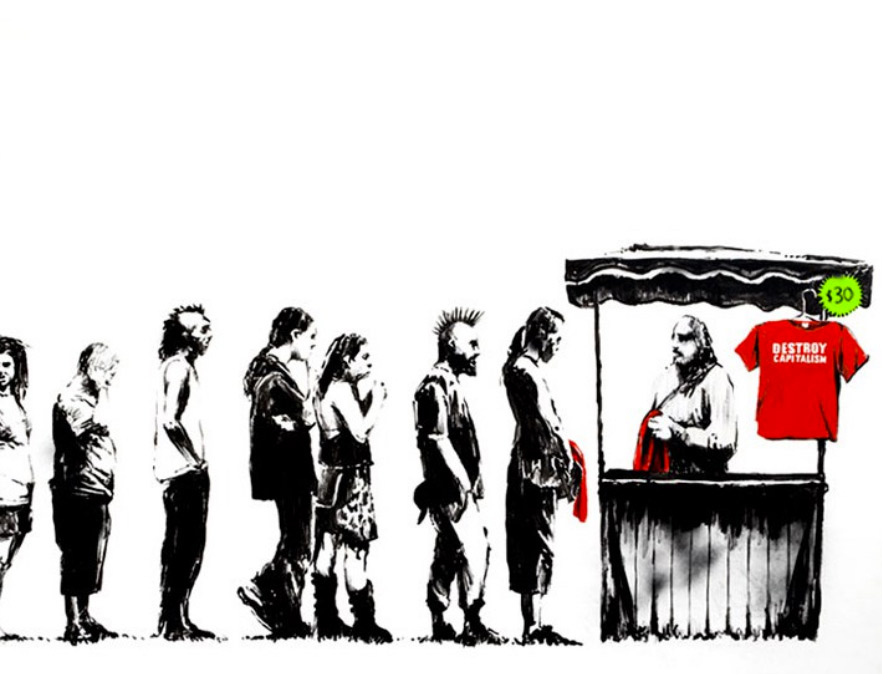My point is that graphic design is useful beyond just a means of making money. It’s about communication.
That is our point. The artists and collectives that we have shown do not usually follow earning money. They are fighting against the system, and denouncing their message, sometimes using the same weapons; for example, placing their own-created ads in bus stops, etc.
Although one thought that come after is when some of them take advantage of their relevance to make a living of their art. I understand that all of us need profits to survive, and along that path at the same time some try to make people consider their behaviour in order to make the world a fairer and better place. Of course it is questionable. In our work we just mentioned this reflexion, then people would make their own opinions about the subject as we are doing here.
It’s great to be altruistic, to do something just for the rightness of it.
But everyone has to eat.
IOW, don’t quit yer day job.
What about the designer who is hired by a corporate-hating deep-pocket client to make those types of pieces? Or in the case you mentioned, having what started as a guerilla campaign suddenly becoming very lucrative. Wouldn’t that be considered hypocrisy?
I don’t imagine the printers printing those billboards are going to do it for free either. In the process of communicating their message, in the above example several of the corporations in question are readily identifiable. Are they implying those companies are all about lies? And are they prepared to defend that accusation? I wouldn’t touch that billboard print with a 10-foot pole.
There’s money there somehow, somewhere, even if the only people that win are the lawyers.
Isn’t communication all about selling an idea?
For instance, these designers are “selling” the idea that greedy corporate advertising is bad. Did they convince you? Or do they need to “sell” it better?
There are multiple degrees of making-money that range from non-profit organizations to predatory capitalism. If a person can fulfill their own personal needs without being greedy, then a person can make a modest living supporting an anti-consumerist agenda without hypocrisy.
Selling ideas is not consumerism unless the idea being pitched is consumerism. Anti-consumerism is one of the ideas being exchanged in the marketplace of ideas.
And on that note, let me sell you on the idea of reading these books. Full disclaimer, I’m not Dan Pink, nor am I affiliated with anyone who makes money from his books.
“Subvertising” is no better than corporate advertising.
This whole recent trend of linking every-goshdarn-thing to politics is a huge part of the problem.
People need to be taught to think for themselves, not listen to what other people tell them is “true” or “fashionable.”
That applies to all instances in life, not just consumeristic (or even anti-consumeristic) communication.
Don’t get me wrong, I find the whole focus on consumerism appalling. It makes me laugh when pundits just can’t seem to figure out why, when the cost of living rises slightly, more people weren’t out buying more “stuff” when even a lightpost can figure out that those people are still trying to make ends meet from years of driving themselves into debt just to survive.
You don’t need more “stuff.” But by all means, if you want more “stuff” that is your own personal choice. I’m not going to talk you out of it. The “stuff” I buy, I look for things that are going to last or hold their value. I might pay a little more but damn, those tools are going to outlive me, that car is going to be worth something at trade in and maybe other people will keep buying consumeristic trash long enough that I can retire on my 401K.

I can’t remember where I read it, but I think it might have been in a psychology journal a few months back. Anyway, the subject was about critical thinking and how long-held assumptions about it being a teachable skill didn’t pan out when put to the test in controlled studies.
If I remember correctly, the study indicated that most people, despite having been taught critical thinking skills, defaulted to using confirmation bias, groupthink and myopic obstinance (my words) when forming opinions on issues that were less than clear-cut or that challenged their previously held assumptions.
People need to be taught to think collectively as well as individually.
My favorite example of anti-consumerist graphic design and animation:
I believe this… and I struggle with it every day. How can they not see the reality? The facts? Why do they see the actual information and disregard it?
I read a study (long time ago) that showed people generally only use maybe 25% of their brain.
Hopefully I’ll someday come to terms with it, and accept that many humans don’t much use the thinking part of their brain.
People do use all of their brain. It’s just that emotions override rational thought.
Also, hormones from other parts of the body effect emotions.
Yes. Most people believe the courses of their daily lives are governed by free will, By far the largest part of that free will, however, is spent figuring out how to best placate emotions and basic urges or adhering to mental templates burned into our minds over a lifetime of experience.
We get hungry, and the cognizant part of our minds is spent figuring out where to go to get rid of that hunger. We get bored and we don’t like how it feels, so we jump on this forum as a distraction from the boredom (like I’m doing now). We look forward to the weekends and make plans because it makes us feel just a little better to do so.
I could go on, but my point is that most people’s intellect is largely used up in efforts to placate and cater to those underlying emotions, urges and biases that we never really think about in the context of how they actually govern the way in which we interact with the world around us.
All I know is, they make me crazy. 
My favorite anti consumer artwork:
And I think these folks missed the point, or maybe they didn’t but the folks who’ll buy them did:
I’m curious about the “controlled studies” that determined “critical thinking” isn’t teachable. If they tried it on anyone over the age of 6, they did it wrong.
Humans need to learn early on that there are consequences for their actions. Critical thinking is learned sometimes through painful trial and error, and I don’t mean abuse. I mean like not getting a trophy for just participating, not getting the toy you wanted for Christmas, having to make a choice between two things equally wanted but you only get one, being told “no” once in a while, being given the opportunity to be the “odd man out,” being taught the difference between right and wrong, being given the opportunity to succeed but more importantly being allowed to fail. Humans aren’t born with a moral compass. Humans aren’t born with Common Sense. If you hand things to kids all of the time, they do not learn that some things are earned through hard work. They don’t learn the pride of accomplishment through the lesson of failure.
Of course an adult is going to fall back on ingrained habits. Humans are lazy organisms. It would probably take training for almost as long as the human has been alive to unlearn what they have learned with regards to their previously held assumptions, if they make no concerted effort themselves in the interests of being more aware of the whole of the world around them.
As for thinking collectively, I’m all for it, in a more libertarian way of thinking rather than the socialist. What I earn is mine. Not yours. I’m all for sharing, but I learned early on that if not everyone brought along enough food for the hike because they didn’t want to carry the weight, everyone ends up with less if you pool the food for the pot.
It’s demoralizing to lessen the pursuit of liberty and happiness.
It’s equally demoralizing if the pursuit of liberty and happiness is a zero-sum game.

